Day: September 10, 2023
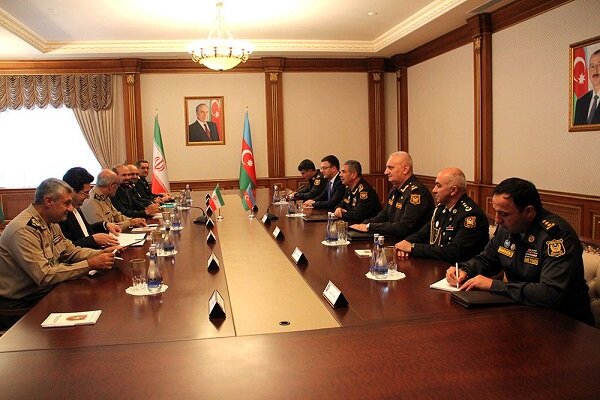
Iran has made it clear that it’s closely watching the situation and won’t accept any geopolitical changes on its doorstep.
Over the last few days, the authorities of Baku and Yerevan traded accusations of trying to initiate new major military escalations. Videos and photos circulating on social media indicated that the accusations may be rooted in reality as both countries have moved to reinforce their troops along the border.
In parallel, the leaders of Baku and Yerevan started discrete diplomatic campaigns to win over regional and international heavyweights in apparent anticipation of a major escalation of tensions.
Iran is closely following the developments as they unfold.
On Saturday, Iranian President Ebrahim Raisi received a phone call from Armenian Prime Minister Nikol Pashinyan as part of the Armenian premier’s diplomatic push to fend off a potential war with Azerbaijan.
In what appeared to be a warning to Azerbaijan, President Raisi said Iran is ready to prevent any changes in regional geopolitics.
For context, the Republic of Azerbaijan has been calling for the establishment of a corridor called “Zangezour” that links the exclave of Nakhchivan to mainland Azerbaijan ever since it won the 2020 Karabakh war.
The corridor, if established, would cut off Iran’s access to Armenia, potentially depriving Iran of an alternative route to Europe. Iran has made it crystal clear that it won’t accept this geopolitical change all while highlighting the need for maintaining the sovereignty and territorial integrity of Armenia and the Republic of Azerbaijan.
But it seems that Iran’s continued calls for peace and security have fallen on deaf ears in Baku and Ankara, which are clearly trying to impose new geopolitical realities.
President Raisi once again reiterated Iran’s firm position regarding the situation in the South Caucasus region.
Responding to a report about the situation in the region presented by Pashinyan, Raisi reiterated the serious opposition of the Islamic Republic of Iran to any tension and changes in the historical borders of the region, according to a readout by the official website of the Iranian presidency.
Raisi emphasized the readiness of Iran as a powerful neighbor to play an effective role in preventing new conflicts and any changes in the geopolitics of the region.
Announcing the Islamic Republic of Iran’s support for the territorial integrity of all countries in the region, President Raisi said, “We believe that regional issues should be resolved through dialogue between the countries of the region, and we are seriously opposed to the involvement of foreign countries in the Caucasus region’s issues. Iran is ready to play its role to help resolve issues through diplomatic talks.”
In another part of this telephone conversation, President Raisi expressed his satisfaction with the report of the Prime Minister of Armenia on the favorable progress of economic cooperation and the implementation of the agreements and the readiness of our country to further develop economic and commercial interactions and accelerate the implementation of agreements with Armenia.
In this telephone conversation, Pashinyan, while presenting a detailed report on the latest developments in the South Caucasus region as well as the field developments in the Caucasus, stated, “The Islamic Republic of Iran has always played an effective and constructive role in establishing, maintaining and strengthening peace, stability, and security in the region.”
While appreciating the positions of the Islamic Republic of Iran in the Caucasus region, the Prime Minister of Armenia also presented a report on the latest status of economic cooperation between the two countries, as well as the measures taken to accelerate the implementation of the agreements reached during his visit to Tehran last year.
Simultaneously, an Iranian military delegation met on Saturday with Zakir Hasanov, the defense minister of Azerbaijan in Baku.
The two sides discussed security issues in the region, according to Fars News.
The timing of the meeting suggests that the Iranian delegation might have conveyed a message from Iran regarding the prospect of new escalations between Baku and Yerevan.
Iran has offered help to achieve peace and security in the South Caucasus region through diplomatic means. But it also said it cannot accept any use of force in the region to dictate new geopolitical realities. It remains to be seen whether Baku and Yerevan heeded the Iranian calls.
By Sadegh Fereydounabadi
First published in Tehran Times
The post Iran closely watching South Caucasus region first appeared on The News And Times – thenewsandtimes.com.
Sunak said he raised the issue with Premier LI Qiang when the two met at a Group of 20 summit in India. He told British broadcasters in New Delhi that he’d expressed “my very strong concerns about any interference in our parliamentary democracy, which is obviously unacceptable.”
The two men met after the Metropolitan Police force confirmed that a man in his 20s and a man in his 30s were arrested in March under the Official Secrets Act. Neither has been charged and both were bailed until October pending further inquiries.
The Sunday Times reported that the younger man was a parliamentary researcher who worked with senior lawmakers from the governing Conservatives, including Alicia Kearns, who now heads the powerful Foreign Affairs Committee, and her predecessor in that role, Tom Tugendhat, who is now security minister. The newspaper said the suspect held a pass that allows full access to the Parliament buildings, issued to lawmakers, staff and journalists after security vetting.
Tensions between Britain and China have risen in recent years over accusations of economic subterfuge, human rights abuses and Beijing’s crackdown on civil liberties in the former British colony of Hong Kong.
Britain’s Conservatives are divided on how tough a line to take with Beijing and on how much access Chinese firms should have to the U.K. economy. More hawkish Tories want Beijing declared a threat, but Sunak has referred to China’s growing power as a “challenge.”
Former U.K. Conservative leader Iain Duncan Smith said news of the March arrests “gives the lie to the government’s attempt not to see China as a systemic threat.”
U.K. spy services have sounded ever-louder warnings about Beijing’s covert activities. In November, the head of the MI5 domestic intelligence agency, Ken McCallum, said “the activities of the Chinese Communist Party pose the most game-changing strategic challenge to the U.K.” Foreign intelligence chief Richard Moore of MI6 said in July that China was his agency’s “single most important strategic focus.”
In January 2022, MI5 issued a rare public alert, saying a London-based lawyer was trying to “covertly interfere in U.K. politics” on behalf of the Chinese Communist Party. It alleged attorney Christine Lee was acting in coordination with the Chinese ruling party’s United Front Work Department, an organization known to exert Chinese influence abroad.
An opposition Labour Party lawmaker, Barry Gardiner, received more than $685,000 from Lee between 2015 and 2020, mostly for office costs, and her son worked in Gardiner’s office. Lee and the Chinese government both deny wrongdoing.
China has repeatedly criticized what it calls British interference in its internal affairs and denied meddling in the politics of foreign nations.
Sunak and Li met days after Foreign Secretary James Cleverly visited Beijing, the highest-level trip by a British politician to China for several years. Chinese President Xi Jinping did not attend the G20 meeting in India
Sunak defended his approach of cautious engagement, saying “there’s no point carping from the sidelines – I’d rather be in there directly expressing my concerns, and that’s what I did today.”
The post UK Leader Sunak Chides China After Report a UK Parliament Staffer Is Suspected Beijing Spy first appeared on The News And Times – thenewsandtimes.com.
-
By
Al Mayadeen English - Source: Politico
- Today 11:34
The Lachin Corridor remains closed until now but could reopen as Azerbaijan reassesses its position following hints that Armenia could accept Russian aid through an alternative route that crosses Azerbaijan.
-

Activists block a road from Stepanakert, the capital of the Nagorno-Karabakh region of Azerbaijan, to Azerbaijani Aghdam demanding the reopening of the blockaded Lachin Corridor linking Karabakh to Armenia on July 18, 2023. (AFP)
On condition that leaders of Nagorno-Karabakh accept aid from Azerbaijan and not only from Armenia, the Azeri government agreed to reopen the Lanchin corridor linking Armenia to Nagorno-Karabakh, according to information citing a senior Azerbaijani official in POLITICO on Saturday.
The announcement comes after authorities in the Armenian-controlled exclave, also known to Armenians as the Republic of Artsakh, announced earlier in the day that it would accept humanitarian shipments from the Russian Red Cross via an alternative route.
The chosen route was through Aghdam, located within Azerbaijani government-held territory, which pushed Azerbaijan to reconsider its position.
In turn, Hikmet HAjiyev, the foreign policy adviser to Azerbaijani President Ilham Aliyev announced that “Azerbaijan expressed its consent as a goodwill gesture to ensure simultaneous opening” of the Lachin Corridor to allow for the transportation of ICRC cargo, reaffirming that “In the Lachin checkpoint, Azerbaijan’s customs and border regime must be observed.”
The Lanchin Corridor stands as the sole roadway linking Nagorno-Karabakh to Armenia, without which Armenia loses its only access to the self-proclaimed Republic of Artsakh. Consequently, severing this corridor has created hardships in the area, affecting the import of essential resources such as oil, electricity, food, and medical supplies. Nevertheless, both the corridor and the region have garnered international attention, given the substantial interests of multiple stakeholders in this region, which is geographically adjacent to Iran.
Azerbaijan builds up military forces on border: Armenian MoD
The Armenian Defense Ministry stated on Friday, underscoring the precarious situation prevailing at the border with Azerbaijan due to the apparent buildup of Azerbaijani military forces.
The mounting tension has raised concerns, prompting the Armenian Armed Forces to take measures aimed at maintaining stability and deterring potential provocations. “The situation continues to be tense as a result of the accumulation of Azerbaijani armed forces during the last two days. Hence, the Armenian Armed Forces continue to take necessary actions to stabilize it and prevent provocations,” the Armenian MoD said in an official statement.
This recent escalation follows a recurring pattern of periodic exchanges of fire along the border between Armenia and Azerbaijan. The most significant flare-up in hostilities took place on September 12, 2022, leaving regional observers wary of a possible repeat of such confrontations.
Read more: Moscow summons Armenian envoy, gives him a ‘tough presentation’
The post Azerbaijan could reopen Lachin Corridor on certain condition first appeared on The News And Times – thenewsandtimes.com.
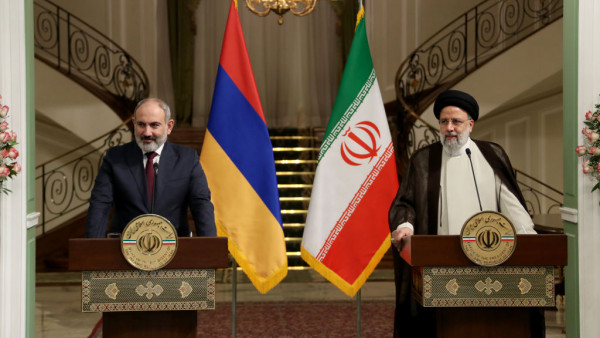
Armenia’s Prime Minister Nikol Pashinyan and Iran‘s President Ebrahim Raisi spoke Saturday, as tensions escalated on Armenia’s border with Azerbaijan.
Pashinyan and Raisi discussed issues including the blockade of the Lachin corridor leading to the Nagorno-Karabakh region by Azerbaijan, and the buildup of the Azerbaijani military around the disputed region, read a statement from the Armenian prime minister’s office released Saturday.
The call was one of a series made by Pashinyan, who also spoke to French President Emmanuel Macron, German Chancellor Olaf Scholz and US Secretary of State Anthony Blinken, among others, according to other statement from the prime minister’s office.
The flurry of calls comes as tensions between Armenia and Azerbaijan increase following Azerbaijan’s blockade of Nagorno-Karabakh by cutting off the Lachin corridor, the only road that connects the enclave to Armenia.
The blockade, which has been ongoing since December 2022, has resulted in food and fuel shortages in the territory.
These tensions have further escalated following the election of Samvel Shahramanyan as the new leader of Nagorno-Karabakh, an act Azerbaijan labelled as “a clear violation of Azerbaijan’s sovereignty and territorial integrity.”
As well as tensions over the current situation with Nagorno-Karabakh, Azerbaijan’s Ministry of Defence claimed that Armenian soldiers opened fire with small arms on its soldiers in the Azerbaijani exclave of Nakhchivan – a claim denied by the Armenian defence ministry.
Armenia and Azerbaijan have had tense relations following both countries independence from the Soviet Union, fighting two wars over the ethnically Armenian territory of Nagorno-Karabakh which is internationally recognised as part of Azerbaijan.
The most recent all-out war, fought in 2020, resulted in a Russian-backed ceasefire, with much of the Armenian held territory, some of which being outside Nagorno-Karabakh, was ceded to Azerbaijan.
However, the two countries have yet to sign a lasting peace settlement even with mediation efforts from international powers such as the EU, the US and Russia.
Iran has sought to present itself as a mediator in Baku and Yerevan’s longstanding dispute over Nagorno-Karabakh, but Tehran has been accused of sending weapons to the Armenians to support its fight for the territory. Iran has denied such claims.
The post Armenia, Iran leaders speak amid Yerevan-Baku tensions first appeared on The News And Times – thenewsandtimes.com.
The G20 summit in New Delhi ended on Sunday as India handed over the bloc presidency to Brazil, while both the U.S. and Russia praised a consensus that did not condemn Moscow for the war in Ukraine but called on members to shun the use of force.
Indian Prime Minister Narendra Modi asked the group’s leaders to hold a virtual meeting in November to review progress on policy suggestions and goals announced at the weekend.
“It is our responsibility to look at the suggestions that have been made to see how progress can be accelerated,” he said in a statement.
On Saturday, the group adopted a Leaders’ Declaration that avoided condemning Russia for the war but highlighted the human suffering the conflict had caused and called on all states not to use force to grab territory.
The consensus came as a surprise. In the weeks leading to the summit, sharply differing views on the war had threatened to derail the meeting, with Western nations demanding members call out Moscow for the invasion and Russia saying it would block any resolution that did not reflect its position.
Foreign Minister Sergei Lavrov, the head of the Russian delegation, said the summit was a success for India as well as the Global South, the world’s developing countries.
The Global South’s position in the talks helped prevent the G20 agenda from being overshadowed by Ukraine, he told a press conference. “India has truly consolidated G20 members from the Global South.”
White House national security adviser Jake Sullivan told reporters the summit declaration “does a very good job of standing up for the principle that states cannot use force to seek territorial acquisition or to violate the territorial integrity and sovereignty or political independence of other states”.
Germany and Britain have also praised the resolution, but Ukraine said “it was nothing to be proud of”.
French President Emmanuel Macron said on Sunday that the G20, which was founded to solve international economic issues, was not necessarily the place to expect diplomatic progress on the war in Ukraine.
However, he said the G20 declaration was not a diplomatic victory for Russia.
“This G20 confirms once again the isolation of Russia. Today, an overwhelming majority of G20 members condemn the war in Ukraine and its impact,” Macron told a press conference after the closing ceremony of the summit.
Japan’s Prime Minister Fumio Kishida said: “Russia’s invasion of Ukraine is something that could shake the foundation of cooperation at G20.
“Also, that is having a major impact on the global economy through such developments as continued increases in food and energy prices.”
Russia’s 2022 invasion of Ukraine has left tens of thousands dead, displaced millions and sown economic turmoil across the world. Moscow, which says it is conducting a “special military operation” there, denies committing any atrocities.
The summit also admitted the African Union, which includes 55 member states, as a permanent member of the G20, underlining the bloc’s inclusivity of more developing countries.
Addressing food security concerns, Lavrov said Russia would return to the Black Sea deal that lets Ukraine export grain if Moscow’s demands were met. Moscow pulled out of the agreement in July over what it called a failure to meet its demands to implement a parallel agreement easing rules for its own food and fertiliser export.
The summit document had called for the safe flow of grain, food and fertiliser from both Ukraine and Russia.
Russia, Ukraine and Turkey are going to continue to discuss the grain deal, Turkish President Tayyip Erdogan said, saying that reviving the agreement was “not hopeless”.
On Sunday, world leaders, including U.S. President Joe Biden, German Olaf Scholz, British Prime Minister Rishi Sunak, French President Emmanuel Macron and Japan’s Fumio Kishida, visited the memorial of Indian independence hero Mahatma Gandhi.
Most of the leaders were barefoot as they walked to the site where Gandhi was cremated following his assassination in 1948 by a Hindu extremist.
Biden later left for Vietnam, missing the last session of the summit. The White House said it was not aware of him having any talks with Lavrov or Chinese Premier Li Qiang, who led their country’s delegations at the summit.
Chinese President Xi Jinping and Russia’s Vladimir Putin both skipped the summit.
“This was one of the most difficult G20 summits in the almost twenty-year history of the forum … it took almost 20 days to agree on the declaration before the summit and five days here on the spot,” Svetlana Lukash, the Russian G20 government negotiator, was quoted as saying by Russian news agency Interfax.
“This was not only due to some disagreements on the Ukraine subject, but also due to differences in positions on all key issues, primarily the issues of climate change and the transition to low-carbon energy systems…”
A European Union official, who did not want to be identified, said on Sunday the Ukraine war was the most contentious issue in the negotiations.
“Without India’s leadership it would not have been possible,” the official said, adding that Brazil and South Africa also played a crucial role in bridging differences.
Related Galleries:
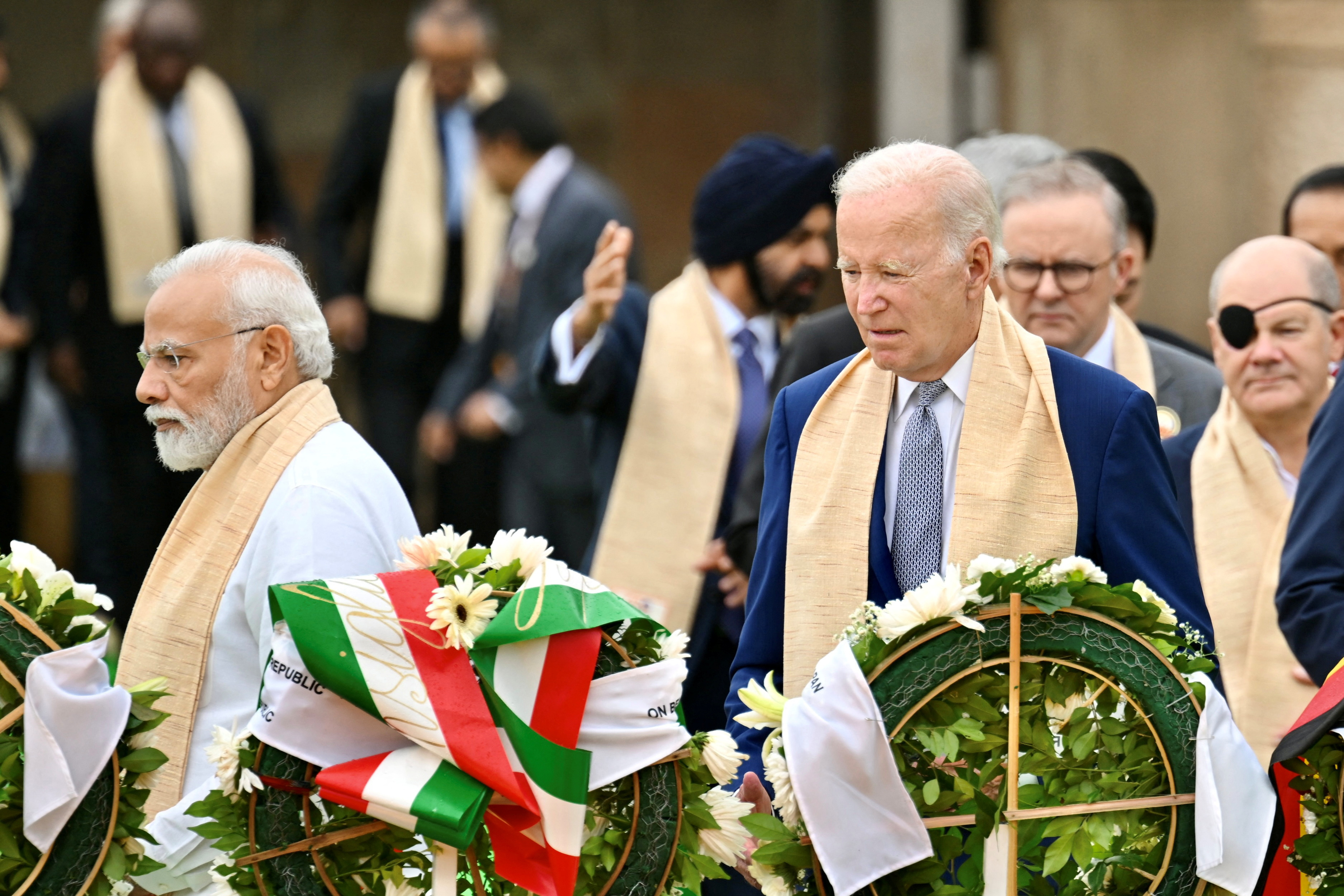




The post G20 summit wraps up in New Delhi; Macron says it confirms isolation of Russia first appeared on The News And Times – thenewsandtimes.com.
Canada bagged their first-ever FIBA Basketball World Cup podium finish at the expense of undermanned United States 127-118 in overtime in a riveting, record-setting bronze medal game on Sunday in Manila.
Hot-shooting Dillon Brooks, who will play for the Houston Rockets next season, powered the Canadians with his tournament-high 39 points, hitting seven of eight 3-pointers, along with four rebounds and five assists. It was the most points scored for a player in a medal-winning game in tournament history.
Brooks earned MVP chants from the crowd with his all-time performance, a far cry from the loudest of boos in Canada’s previous games.
Shai Gilgeous-Alexander, Canada’s leading scorer, rebounder and passer, finished with 31 points, six rebounds and 12 assists. “It was fun trying to take what the defense gives me,” he told reporters.
Team USA’s NBA Rookie of the Year Paolo Banchero, Defensive Player of the Year Jaren Jackson Jr, and forward Brandon Ingram were sidelined due to illness.
Team USA’s leading scorer, Anthony Edwards of the Minnesota Timberwolves, recorded 24 points, five rebounds and three assists. Fan favourite Austin Reaves sparked U.S. off the bench with 23 points, while three more U.S. players scored in double-digits.
Canada capitalised on a characteristically lethargic U.S. start to take a 34-21 lead in the first quarter, before Team USA stormed back in a see-saw second quarter to trim their deficit to 56-58 by halftime.
Brooklyn Nets forward Mikal Bridges sent the game into overtime by rebounding his own missed free throw and then hitting a corner three with 0.6 seconds to go. Canada’s Kelly Olynyk missed potentially game-winning three at the buzzer, ending the fourth quarter at 111 each.
Team USA, previously unbeaten in their four bronze medal matches, recorded the most points they have conceded in a World Cup game.
Canada achieved multiple milestones in the tournament, including semi-final debut, while qualifying for the Summer Olympics for the first time since 2000.
Despite the defeat, the United States finished better than their seventh spot in 2019, their worst-ever major international tournament result. The U.S. have won the tournament a record five times.
Related Galleries:
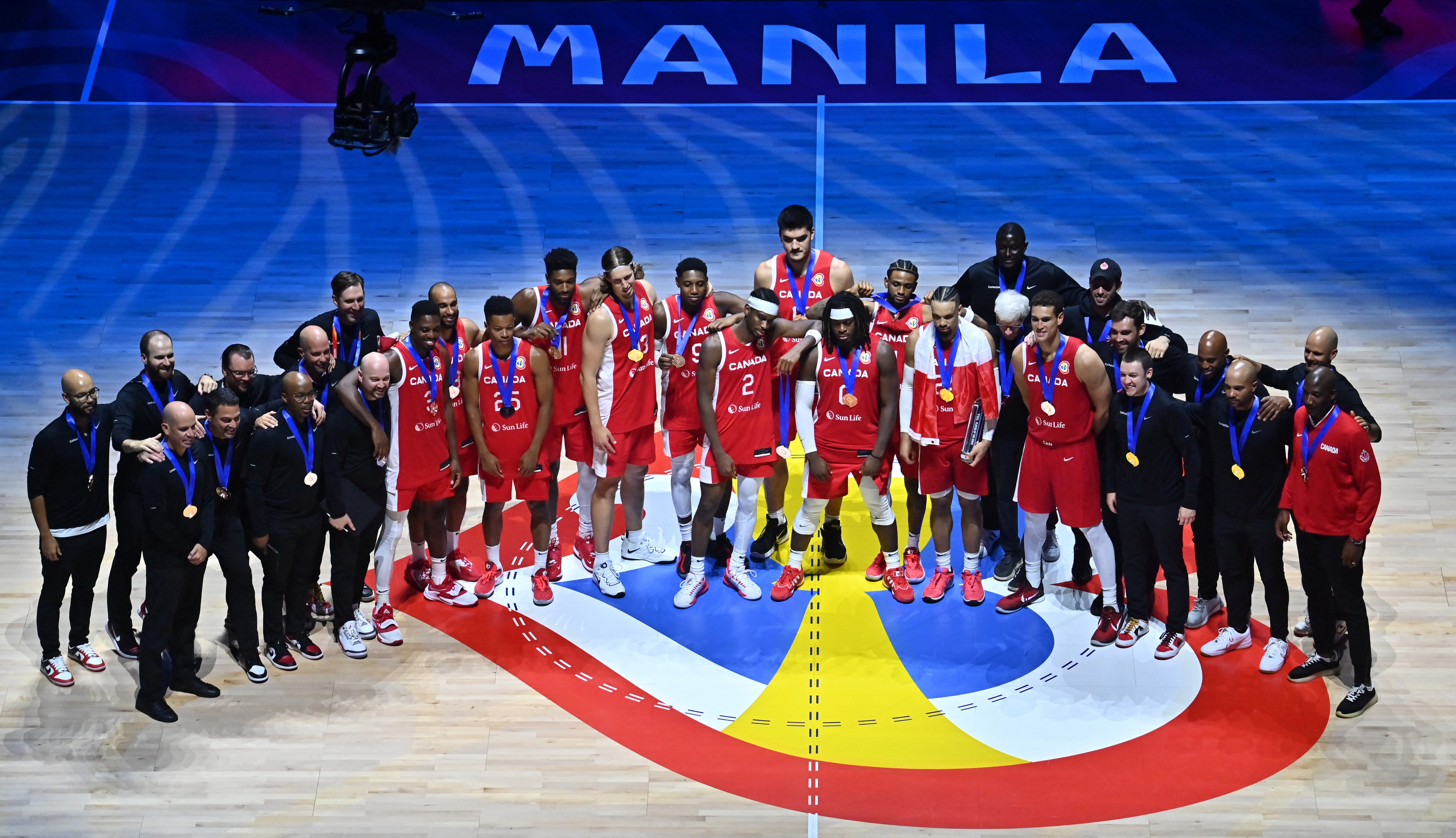
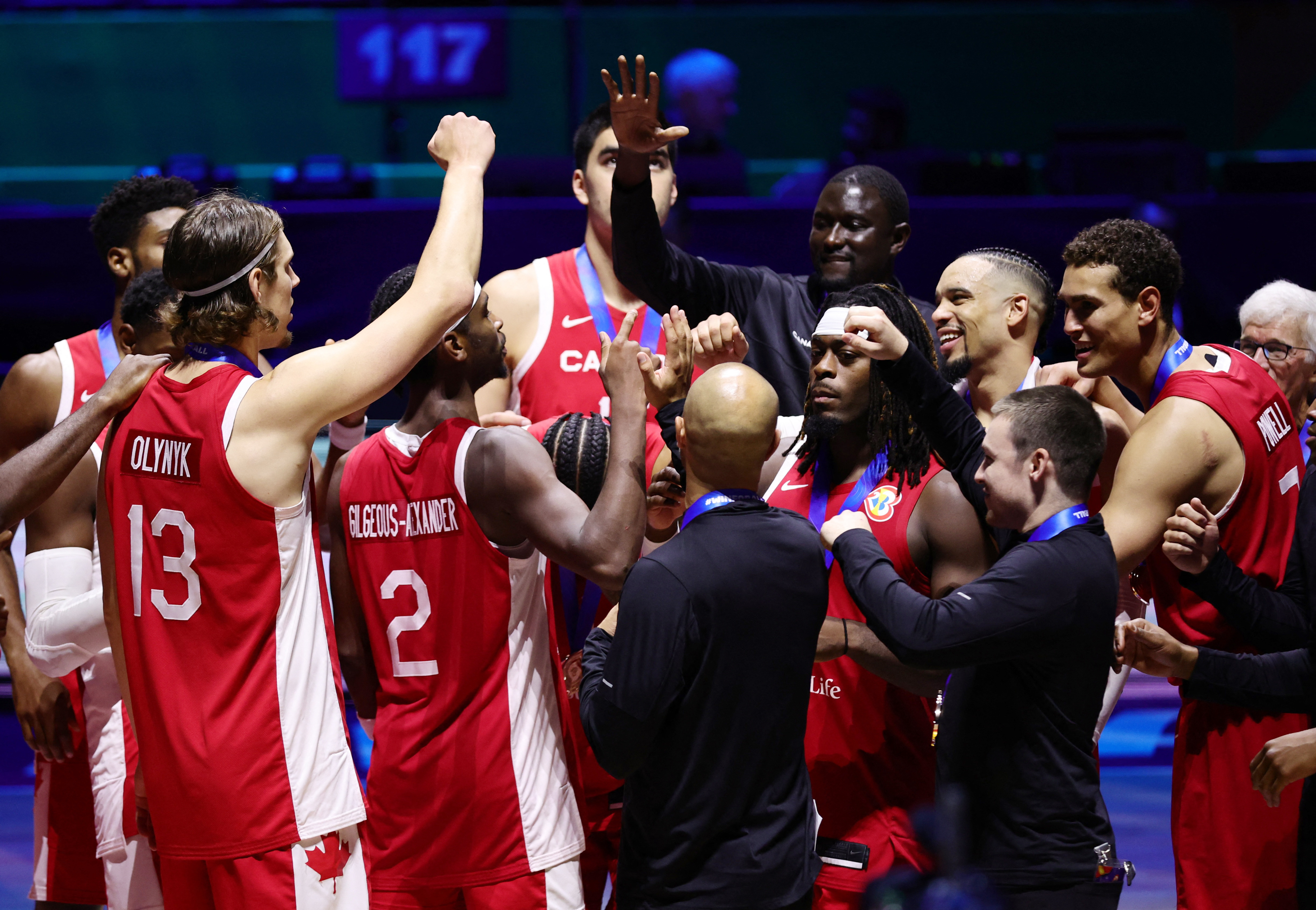
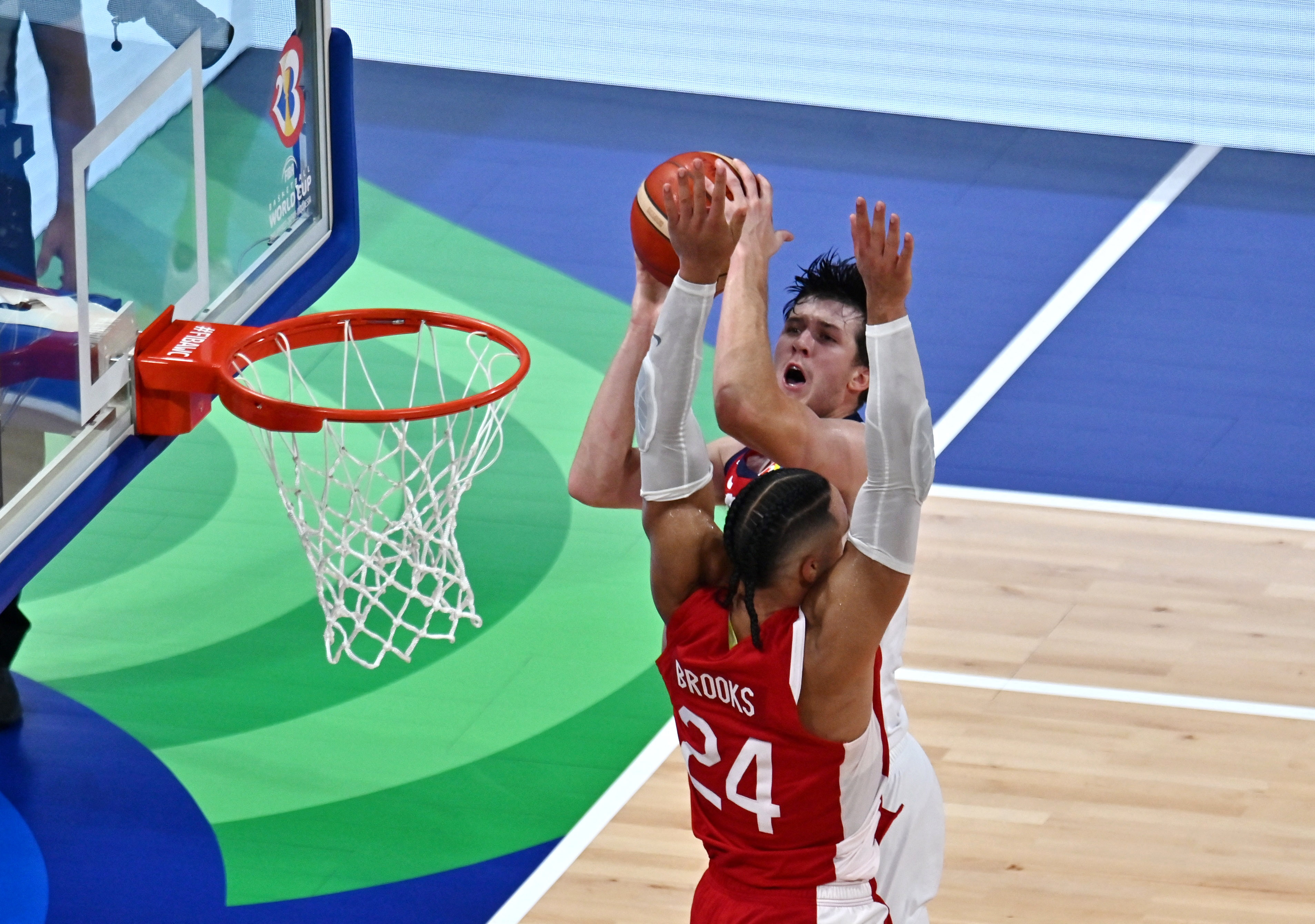
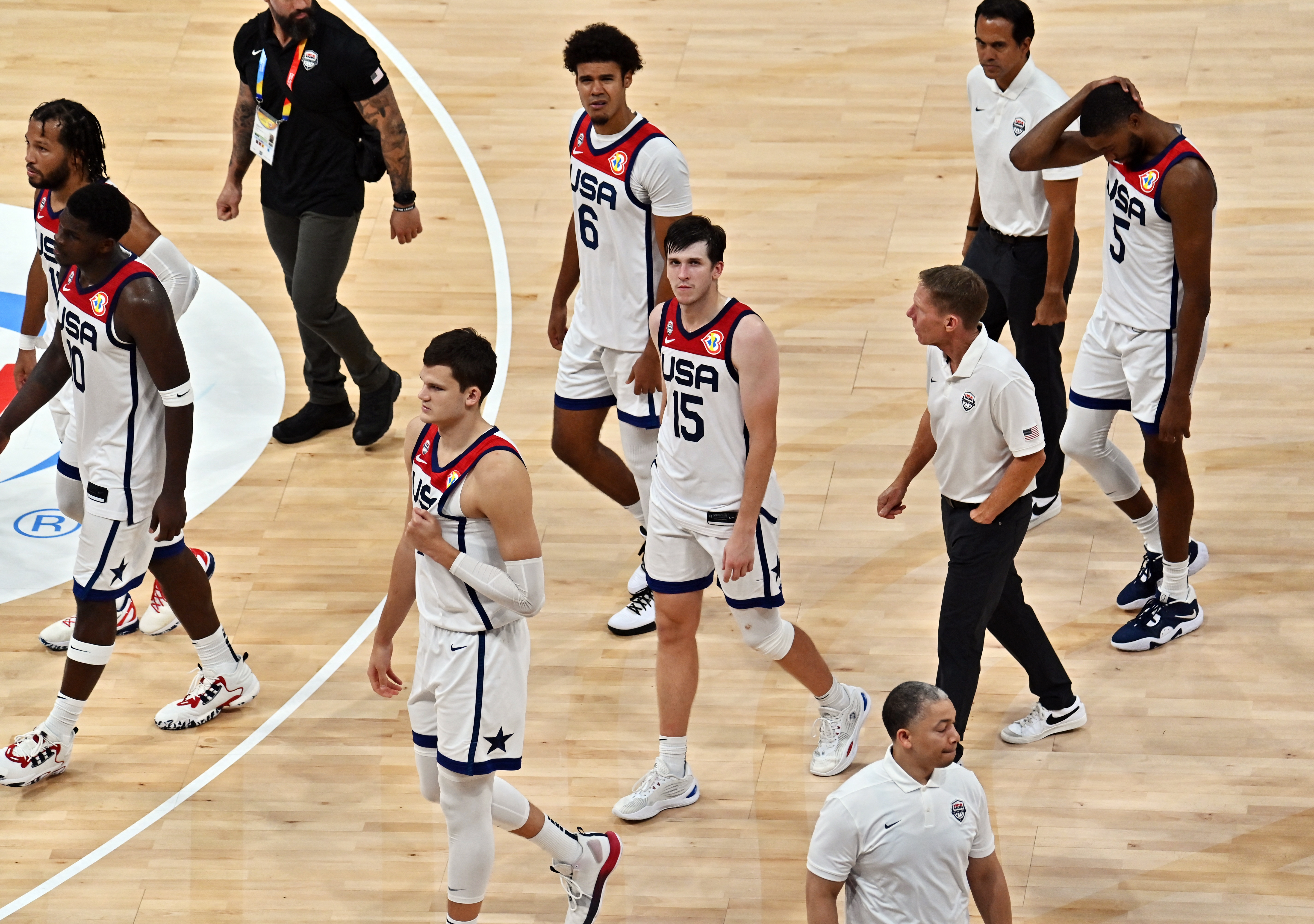
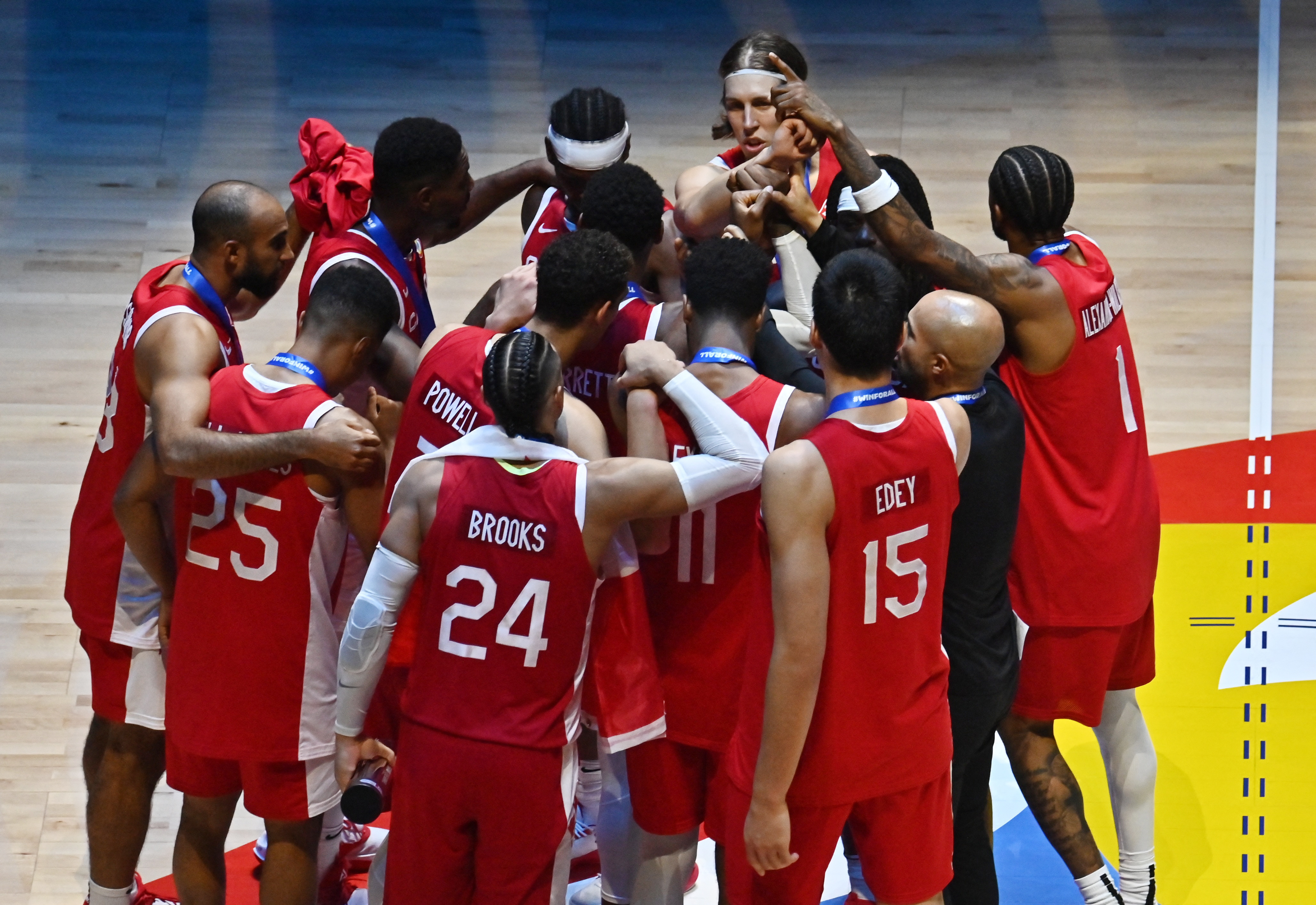
The post Basketball Canada outlasts U.S. in OT, capture first-ever basketball World Cup medal first appeared on The News And Times – thenewsandtimes.com.
Meanwhile, the British Defense Ministry said Sunday Russia’s Pskov oblast, near the Estonian border, has organized “volunteer security patrols” to bring a stop to drone attacks against Kresty Air Base.
The ministry said, due to the limited range of quadcopter drones, the attacks on Kresty were almost certainly launched from Russia. The volunteer patrols will “likely” serve as a deterrence, according to the ministry.
The use of volunteers indicates that it is “highly likely” that there is a shortage of trained security personnel within Russia,” the ministry said.
Ukraine’s counteroffensive against Russian forces will continue in the coming months, regardless of inclement weather when fighting would be harder to conduct, Ukrainian intelligence chief Kyrylo Budanov said Saturday.
“Combat actions will continue in one way or another. In the cold, wet and mud, it is more difficult to fight. Fighting will continue. The counteroffensive will continue,” Budanov said.
Ukraine’s much-vaunted counteroffensive has seen some success in the south where Ukrainian forces have retaken a dozen villages over the past three months.
Ukraine’s armed forces are making “gradual tactical advances” against Russia’s defensive line east of the town of Robotyne, the British ministry said Saturday in its daily intelligence update on Russia’s invasion of Ukraine.
But Ukraine’s military operation has been slower than anticipated because of hurdles that include vast minefields and heavily entrenched Russian forces.
Budanov’s comments, made during a news conference in Kyiv, indicate Ukraine does not intend to halt its push when the weather turns harsher later this year.
The slow progress of the counteroffensive has sparked concerns among Kyiv’s supporters that the West could face an uphill battle to maintain its support and the military aid needed to keep Ukraine battling at the same intensity level.
Ukraine’s advances in the southeastern Zaporizhzhia region, now centered around Robotyne and Verbove, are seen as a crucial part of an operation that seeks to split Russia’s occupying forces in half in the south but remains far from that goal.
“Our counteroffensive is happening in several directions,” Budanov said, acknowledging that progress had been slower than he wanted and describing the situation as difficult.
Apart from the huge concentration of Russian mines, he identified the large number of small Russian “kamikadze” drones as a key factor in slowing Ukraine’s progress so far.
Russian air defense says it shot down three Ukrainian drones over Crimea on Saturday, one in the northwest and two in the west of the peninsula, Sergei Aksyonov, the Russian-installed head of the local administration, said on a post on Telegram.
Reuters could not verify the claims, and there were no immediate reports of damage or casualties.
G20 summit
The leaders of the world’s 20 wealthiest countries adopted a consensus declaration Saturday at the G20 summit, calling on all states to refrain from the use of force to seize territory but stopped short of condemning Russia for its war on Ukraine.
Despite the consensus declaration, the group remains deeply divided over the war. Western nations were pushing for a strong denunciation of Russia in the Leaders’ Declaration, while other countries demanded a focus on broader economic issues.
On the war in Ukraine, the declaration says that all states must refrain from threats or use of force to seek territorial acquisition against territorial integrity and sovereignty or political independence of any state. It also called the use or threat of use of nuclear weapons “inadmissible” and urged for peaceful resolution of conflicts using diplomacy and dialog.
The G20 noted “different views and assessments of the situation,” regarding the war in Ukraine.
They called on Russia and Ukraine to ensure immediate and unimpeded deliveries of grain, foodstuffs, and fertilizers from Russia and Ukraine for the sake of global food and energy security and asked for the end of military destruction or other attacks on relevant infrastructure.
VOA White House Correspondent Anita Powell contributed to this story.
The post Russia Launches Two-Hour Drone Attack Over Kyiv first appeared on The News And Times – thenewsandtimes.com.
Canada bagged their first-ever FIBA Basketball World Cup podium finish at the expense of undermanned United States 127-118 in overtime in a riveting bronze medal game on Sunday in Manila.
NBA players Shai Gilgeous-Alexander and Dillon Brooks took control in overtime, scoring a combined 11 points for Canada.
Brooks, who will play for the Houston Rockets next season, powered the Canadians with his tournament-high 39 points, along with four rebounds and five assists.
Gilgeous-Alexander, Canada’s leading scorer, rebounder and passer, finished with 31 points, six rebounds and 12 assists.
Team USA’s NBA Rookie of the Year Paolo Banchero, Defensive Player of the Year Jaren Jackson Jr, and forward Brandon Ingram were sidelined due to illness.
Team USA’s leading scorer, Anthony Edwards of the Minnesota Timberwolves, recorded 24 points, five rebounds and three assists. Fan favourite Austin Reaves sparked U.S. off the bench with 23 points, while three more U.S. players scored in double-digits.
Canada achieved multiple milestones in the tournament, including semi-final debut, while qualifying for the Summer Olympics for the first time since 2000.
Despite the defeat, the United States finished better than their seventh spot in 2019, their worst-ever major international tournament result. The U.S. have won the tournament a record five times.
Related Galleries:





The post Basketball Canada ekes past U.S., capture first-ever basketball World Cup medal first appeared on The News And Times – thenewsandtimes.com.
Prime Minister Nikol Pashinyan told his cabinet on Thursday that he has received information suggesting that Azerbaijan is planning to re-open the Lachin Corridor only for one-way outbound movement to persons leaving Artsakh.
Without elaborating on the information, Pashinyan said that Azerbaijan is continuing its illegal blockade of the Lachin Corridor. He pointed out that a humanitarian convoy of trucks carrying 400 tons of assistance from the Armenian government, and other trucks from private sector and regions in France, remain stranded at the entrance of the Lachin Corridor.
“At the same time, the humanitarian situation in Nagorno-Karabakh remains tense. The only change in the situation is that a certain movement of people requiring treatment and other citizens has begun along the Lachin Corridor through the Red Cross and the Russian peacekeeping contingent in Nagorno-Karabakh. At the same time, we have received credible information that plans are being developed to open one-way transit along the Lachin Corridor, meaning to allow only exit from Nagorno-Karabakh,” Pashinyan said.
The prime minister reiterated that Baku continues its breach of provisions of the November 9, 2020 agreement.
Pashinyan also accused Azerbaijan of “torpedoing” any dialogue with Stepanakert.
“Our information suggests that Baku, through various methods, is continuously torpedoing dialogue with Stepanakert, and is trying to put the responsibility for this on Nagorno-Karabakh,” said Pashinyan who reiterated his government’s policy that issues relating to the rights and security of Artsakh should be addresses through direct talks between Stepanakert and Baku, with international mechanisms.
He explained that clause 7 of the November 9, 2020 statement stipulates the return of refugees and displaced persons not only to Nagorno-Karabakh but also adjacent regions.
“This means that Armenians of not only a number of villages of Martakert, Hadrut and Martuni, but also Getashen, Martunashen, Shahumyan and other regions must have the opportunity to safely return to their homes, with dignity,” Pashinyan said.
He also told his cabinet that Yerevan has officially submitted new proposals for the much-discussed peace treaty between Armenia and Azerbaijan.
“I’d like to underscore the commitment of the Republic of Armenia to the peace agenda. I have to inform you that we’ve conveyed to the Azerbaijani side our new proposals on a peace treaty between Armenia and Azerbaijan,” Pashinyan said.
The post Azerbaijan Intends to Open Lachin Corridor to Outbound Traffic Only, Pashinyan Warns first appeared on The News And Times – thenewsandtimes.com.
